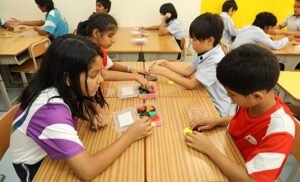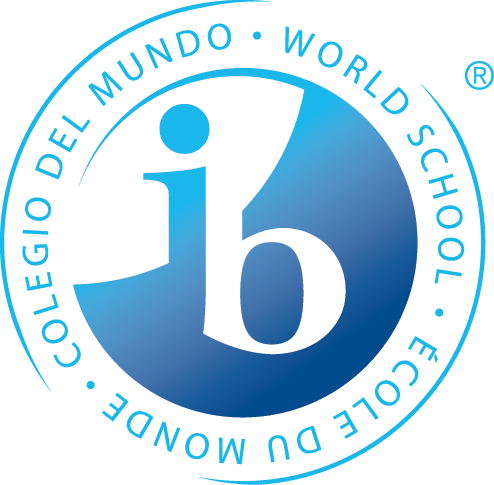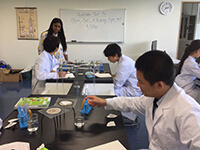When it comes to an IB vs IGCSE comparison, it makes sense to start with an overview of the two systems of education. The IB or the International Baccalaureate system of education offers modern holistic curricula for students in the 3 to 19 years age group.
IGCSE is an acronym for International General Certificate of Secondary Education and it offers a modern and holistic Cambridge University-backed curriculum for students in the 14 to 16 years age group. This curriculum is offered by leading international schools in Tokyo and elsewhere in the world.
Before we delve into the difference between IB and IGCSE, we need to first understand how students and parents might have varying perspectives on what to expect from a school education.
Today’s children exist in a fully digitised universe where rapid technological changes require them to forever play a game of catch-up. This naturally requires them to look at education differently from their parents’ time when standards and benchmarks were quite different.
What is the IB Curriculum?
The IB curriculum is one of the leading international curricula catering to the educational needs of students in the age group of 3 to 19 years. It comprises four parts consisting of the Primary Years Programme (PYP), Middle Years Programme (MYP), Diploma Programme (DP) as well as the Career Related Programme (CP).
The curriculum is known for its interdisciplinary approach and its emphasis on critical and independent thinking on the part of the students.
What is the IGCSE Curriculum?
The IGCSE or International General Certificate of Secondary Education (IGCSE) curriculum is one of the most sought-after education systems for students in the 14 to 16 years age group. It is known for its diversity of subjects encompassing humanities, languages, science, mathematics, technical, vocational and even creative subjects.
What’s more, students are allowed to choose a combination that best suits their temperament allowing them to customise their curriculum as per their aptitude.
The Difference Between the IB & IGCSE Programs
The fact that both the IB and IGCSE programs are offered by the premier Tokyo school GIIS (Global Indian International School) is a reflection of the fact that the curricula have some unique distinguishing features that make them special.
Let us look at what these might be.
1. Caters to Different Age Groups
While the IGCSE curriculum is meant for students who are anywhere between 14 to 16 years of age, the IB board has a wider range of references as it is a curriculum that caters to the educational requirements of children from 3 years to 19 years of age.
2. Subject-based vs. Interdisciplinary
While the IGCSE curriculum is subject-based and empowers students to choose from a diverse range of subjects in accordance with their passion and aptitude, the IB curriculum takes a very holistic approach with its emphasis on interdisciplinary learning that encourages critical and independent thinking.
3. Evaluation Methodology
The IGCSE system is known to be in favour of conventional formal examinations as well as coursework to get a sense of the student’s capabilities. The IB system, on the other hand, has an amalgam of internal and external examinations to evaluate the progress of students.
Which Curriculum Is Better – IB or IGCSE?
It is very difficult to say as to which of the two curricula is better as both are highly regarded across the world. In the ultimate analysis, it depends upon what one expects from one’s education. If one is looking at flexibility of choice and the ability to follow one’s passions IGCSE is a better choice of curriculum.
If obtaining admission or taking up employment abroad is one’s expectation from one’s school education, the IB curriculum’s universal recognition and acceptance is a big plus.
Before making a choice between the two, it also makes sense for the students concerned to know that IB is considered tougher and more challenging than IGCSE. At the same time, IGCSE gives a student greater opportunity to delve into their subjects of interest in great detail. What it boils down to in the end is what one’s goals are with regard to school education.
Conclusion
We live in times where the way education is imparted is undergoing a tremendous metamorphosis. With rapid technological advances changing the basic paradigm of education regularly, the choice of curriculum for one’s school-going child becomes a huge dilemma for parents.
Both IB and IGCSE are among the leading curricula of the world and both have evolved to meet the requirements of school-going students in the digital age. That being stated both curricula have their plus points vis-a-vis each other.
To start with, the IGCSE curriculum caters to only those students who are in the 3 to 19 years of age group, whereas the IB system spans the entire spectrum of school education right from 3 years to 19 years of age. Other than that the primary distinguishing factor is that IGCSE is a subject-based system of education offering flexibility in the choice of subjects whereas the IB system is an interdisciplinary curriculum that lays great emphasis on critical and independent thinking.
Going forward, one can expect both IGCSE and IB curricula to continue to be amongst the best-known international curricula popular with leading schools around the world, especially the international ones. With the world becoming increasingly globalised and interconnected the popularity of the two international curricula is only going to increase.
As to which of the two is better depends upon what students want from their curriculum. As discussed above, both the IGCSE and IB curricula have their unique plus points that suit different sets of requirements. It is not surprising to discover that both IGCSE and IB schools are growing in number around the world. This is true of Tokyo as well, which has its own share of such schools.
The choice of either curriculum is best left to the students in question and their parents, as they know best, which one of the two suits them more. As the adage goes, To each their own.




























